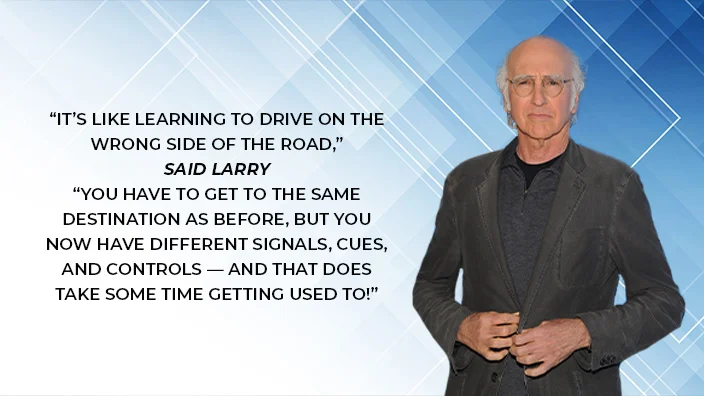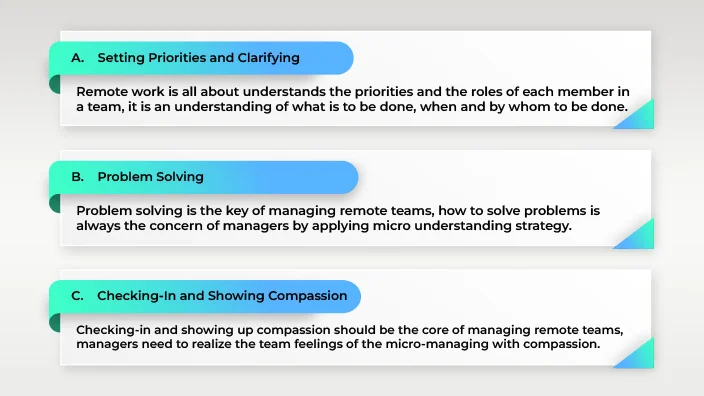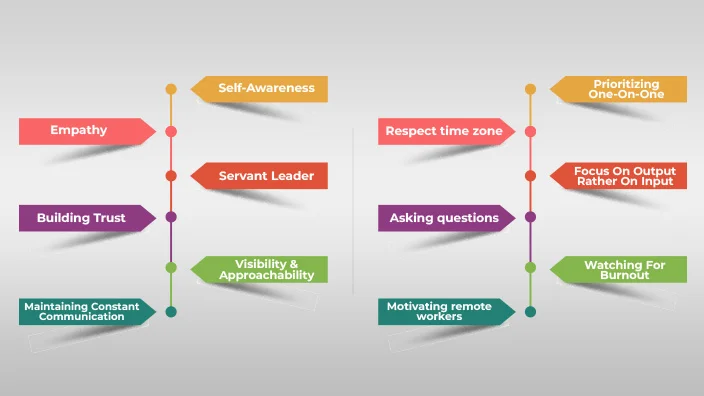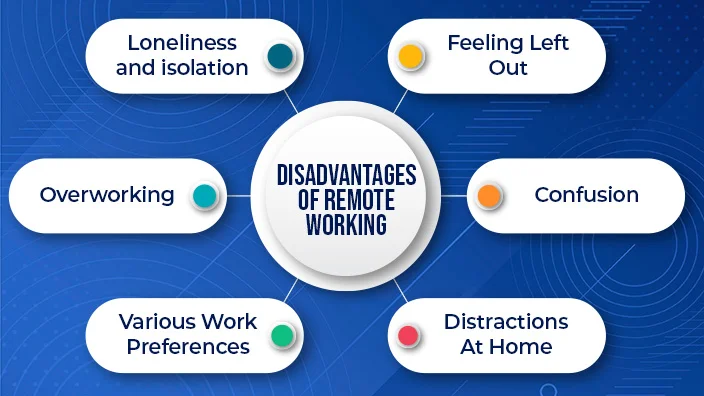The shift from physical into online mode was a big challenge for whole the world during the Pandemic of Covid-19. No one was really ready for the change, e-learning for students, e-commerce, online business etc. were challenges to the world.
Along with managing team members for employers, working for employees was also tough and this remote environment or company culture was also something never tried before by human beings.
This study addresses a few ideas of remote working, virtual work common challenges, managing remote teams, artificial intelligence and all the concerned details. It also adds the challenges faced in remote team management.
Table of Contents
- Differences: Remote Work Vs. Onsite Work
- Larry’s Words About Managing Remote Teams
- From Onsite to Remote Setting
- Staff to Return their Offices
- Micromanagement Vs. Micro-understanding
- Recommended, Micromanaging Or Micro-understanding?
- Any Changes in Role of Managers
- Managers are As Enablers, Not Enforcers
- Where Micro-Understanding Is Necessary?
- What Are The Traits Of Great Remote Managing?
- Disadvantages of Remote Working
- Conclusion
- Frequently Asked Questions
Differences: Remote Work Vs. Onsite Work
Understanding the leading remote teams needs to know the differences between the remote work and onsite work. Remote work is the doing of all the assigned tasks from your home or any other places other than your office.
Onsite work is the opposite of it, it is the doing all the assigned tasks of your office within your office area physically present there. It can be assumed that remote work is online work while the other is working in the office.
Related Post:Creativity In Entrepreneurship
Larry’s Words About Managing Remote Teams
Once Larry was asked about the dynamic shift in the world generally and particularly about remote team management, he astonished the interviewer while replying his question, his words are;

From Onsite to Remote Setting
There was no concept about online learning, working, business etc. and the world was only about the traditional and the typical sort of work.
The Pandemic of Covid-19 changed the world, witnessing the shift in the dynamic from physical to online. During the Pandemics of Covid-19, the entire globe was shattered, markets, schools, universities, retailer shops, industries etc. all were closed.
 Scientists thought of kicking the worlds market again with different methods and one of the inventions of that time was online or remote employees work to stay connected.
Scientists thought of kicking the worlds market again with different methods and one of the inventions of that time was online or remote employees work to stay connected.
Staff to Return their Offices
Managing remote teams were challenging and it was hard for many managers and many organizations to manage remote teams, during the Pandemic all of them wanted their employee experience to join their offices back but it was impossible.
There aroused the concept of micro-understanding and micromanaging which are both much related and interdependent of each other. What is micro-understanding and micromanagement?
Micromanagement Vs. Micro-understanding
Micromanagement is the management style of managers often referred as negative, it is the excessive and restrictive check on the employees with the extra and unnecessary supervision.
In employee engagement, the managers often throw heavy burdens of checklists, reviews, level of approvals and other restrictive activities that disempower the employees.
Micro-understanding is the opposite of the former. It is the understanding of the work of remote employees with flexibility and vulnerability, the managers often get the burden of their employees and accept the mistakes.
Recommended, Micromanaging Or Micro-understanding?
While managing remote employees micro-understanding is highly recommended for the managers to adopt and work with those principles.
As mentioned in the very beginning of the previous section that micromanagement is a negative term and is not liked by the employees and all great managers.
It is also said that the micro-understanding is the resource of employees while the micromanagement is the obstacle to them. You cannot micromanage while doing remote team management, the effective one is micro-understanding.
Any Changes in Role of Managers
The managers and employees were used to the typical and the traditional work, the employees were micromanaged by the managers in their offices. The managers always threw burden on their employees and managed them restrictively.
Those roles of managers did not work in managing the remote teams, they failed. The employees got it hard to meet all the expectations of their managers and they were used to the assistance of their mangers in all tasks.
The world witnessed a new way of managing remote teams and remote team building that was micro-understanding. The roles of the managers changed and they also changed according to the situations and expectations.
Managers are As Enablers, Not Enforcers
 As discussed in the previous section, managers failed in their micromanagement strategy, it did not work while managing many remote teams. So what should be the role of managers in remote work?
As discussed in the previous section, managers failed in their micromanagement strategy, it did not work while managing many remote teams. So what should be the role of managers in remote work?
The roles of the managers should be enablers, not enforcers. They should be helpers, enablers, motivators, and the facilitators of their remote employees.
The concern of the managers, how to control and assist them while the employees are out of sight compelled them on changing their roles. They proved that productivity is not is the onsite work, it is possible in the remote work.
Where Micro-Understanding Is Necessary?
There are some situations in which micro-understanding is necessary and vital, the situations are as follows; 
What Are The Traits Of Great Remote Managing?
This section is particularly for the managers who wanted to be great managers while managing remote teams. If you do not have the traits, adopt them in yourself and if you already have these traits then you are a great manager and can easily manage remote teams.

Self-Awareness
Self-awareness is the first trait great managers have in managing the remote team members. Great managers want to build relationship and trust, they realize their employees that they are really helping them.
They give their employee free hands of asking them every time and about every minute thing. They not only rectify their remote employees but also have their self-awareness of each and every thing what they are doing.
Empathy
All great managers are empathetic and kind to their employees while managing virtual teams. They know how to be humble and how to deal all the ambiguities and questions of their remote employees.
The means of communication in remote work rather than in person meetings or in person communication are often; zoom meetings, WhatsApp calls, group chats, and countless others, so addressing each and every one’s queries would be challenging.
Servant Leader
Very often managers realize this trait, they just micro-manage their employees rather than micro-understanding.
 Managers will not impose restrictions and short deadlines, they will work with them and work for them. They will teach their remote employees and will learn of them as well.
Managers will not impose restrictions and short deadlines, they will work with them and work for them. They will teach their remote employees and will learn of them as well.
It is not only for managing remote teams but also for the onsite setting as well. Employers should have kindness, empathy, self-awareness, tolerance, compassion, love, trust and confidence in their employees.
Building Trust
For managing the remote teams, the great managers build trust in their employees and provide them the right tools and ground rules for innovation and creativity. Building trust helps the employees in getting rid of their loneliness and boredom.
Asking for results and providing positive feedback would enable the employees to feel inclusive, empowered, valued and respected. So building trust in managing remote teams would great.
Visibility and Approachability
Face to face interaction is vital for working, for employees not interacting with their managers feel them isolated. Visibility and approachability is the key trait for managing remote teams.
Remote managers are the only facility employees have, if the managers do not show their interest in the remote work the employees get exhausted.
So it would be better for both the employees and the remote managers to interact via video conferencing. By doing so all of them would learn what should be done by whom and when to be done.
Maintaining Constant Communication
The discussion is concerned with this fact that maintaining constant communication preferences are ways of combining the remote team members.
 It should be taken into consideration that the time in remote work is not always same for all, time zones may be different. One working from United Sates cannot attend the video calls all the time because of the various time zones.
It should be taken into consideration that the time in remote work is not always same for all, time zones may be different. One working from United Sates cannot attend the video calls all the time because of the various time zones.
So great managers respect time zones of their employees and do encourage social interactions. One cannot reply instantly the slack messages of the managers.
Prioritizing One-On-One
Prioritizing one-on-one is also one the traits of great managers, they get in-touch at least a day if not all the time. This 1:1 communication is also called Asynchronous communication, means the employees should meet other team members and the managers as well.
Great leaders schedule ask me anything which is shortly termed as AMA. With the help of AMA, employees ask their queries and the remote managers are also available at the time to address the challenges faced by the remote workers.
Respect Time Zone
In the remote work, the employees may be from locations having different time zones than that of their managers. So great remote managers respect the time zones of their employees.
The rules are also applicable for the remote workers that their mangers cannot be available all the time for their managers to ask and get guidance.
Focus On Output Rather On Input
Great remote managers always focus on the results rather than the output given by the employees to work.
 An employee may have family time, personal affairs in life, so he/she cannot give full time to work. Mangers give appreciative feedbacks to the assigned tasks of the employees and rely on their results rather than the input given them.
An employee may have family time, personal affairs in life, so he/she cannot give full time to work. Mangers give appreciative feedbacks to the assigned tasks of the employees and rely on their results rather than the input given them.
It is the key of micro-understanding; managers keeping aside the micromanagement check the works of the employees and celebrate the small victories and short term goals.
Asking Questions
It is often misinterpreted and managers while trying to micro-understand adopt the micro-management and celebrate it that they are doing great work. They ask questions frequently and over restrict their employees.
They should ask questions but not all the time. If a task is assigned to the employees, by the end of the day or after an hour the assignment is given, managers should show their visibility to clear ambiguity if any is there.
Employees should not directly message managers, or should not convey direct reports, they should do it in scheduled meetings, formal meetings, and regular meetings.
Watching For Burnout
Managers know the situations of their employees and they timely respond to them. It is the characteristic of great managers to spot the burnouts in their employees because most of them do not admit their selves that they are having tough times.
There can also be the case in which the employees do not realize the burnouts but great leaders do. The signs and symptoms should be; delaying schedules, not attending meetings, loss of interest and focus in work, underperformances, losing cool and countless more.
Taking Advantage of Technology
At the very beginning of this article, it is mentioned that soon after the Pandemic of Covid-19 all the managers wanted their staff to return to their offices.
Managing remote teams is a part of technology and cannot be done without collaborative applications and internet connectivity, so great managers use technology like Google, Skype, Zoom, WhatsApp, and other collaboration tools to meet their employees collaborate virtually.
It was new and challenging for the managers and their employees to get benefits of them.
Motivating Remote Workers
Great managers always celebrate the small victories and achieving the short term goals of their employees with positive feedbacks and rewards.
They prefer output rather than input, they do not celebrate long work hours intervals and appreciate the productivity the employees give in short time.
They often respond with sweet and compassionate words and appreciate team members work rather than individual extra efforts. Motivating employees while managing remote teams is all about motivating and encouraging employees to reach out and get the work done.
Disadvantages of Remote Working
Remote work is not always appreciated and still some managers and employees get it challenging to meet the expectations of the remote work. There are some drawbacks of remote work on account of which it is not preferred.

Loneliness And Isolation
If you are working remotely and your manager is not skillful and could not reach out, you must feel alone and isolated. Keeping aside the unskillful managers, if it is your first time to work remotely or to be managed remotely, you will get exhausted and will feel isolation and loneliness.
The workers used to onsite setting always find it challenging at the very beginning, and get over the traditional methods. Once they use the technology and work without the invigilation of managers, they find it a little bit of easy.
Great managers while managing remote teams always try to prevent their employees from loneliness and isolation.
Feeling Left Out
Employees often feel left out of meetings and other discussion while remotely working. Great managers while managing remote teams always prefer one on ones and team meetings to assign the roles to all the team members.
So the communication is the key to give confidence to all the employees and to build trust in them. Research conducted on managing remote teams always reported that employees often feel left out along with feeling lowliness and isolation.
This factor should be removed by effective communication and one-on-one meetings.
Overworking
Work from home may also be challenging in managing time and saving time for personal life. Remote work is not that much punctual, one having family would give time to one’s family and would not get enough time for work.
In the opposite case, employees often get it hard to give enough time to their families and work all the time to meet the deadlines. This is a drawback of remote work and employees do not manage time effectively.
Great managers often micro-manage their employees and advise them not to work all the time while killing the time of their families.
Confusion
Remote employees always face confusions in understanding instructions of their work assigned by their managers. They cannot get the instructions easily and if they hesitate in asking their managers they would ultimately compromise on productivity.
Great managers arrange virtual meetings to avoid confusion and to deliver the concerned instruction of work.
Various Work Preferences
It has discussed that you should respect time zones, your remote workers be from different locations having different time zones. Remote work has this downfall that workers often get the challenge of time zones.
Great managers while managing remote teams compromise on this thing and allow the workers to complete the assigned work in flexible time.
Distractions At Home
One of the shortcomings of remote work is distractions at home. An employee may have his/her family, personal affairs in life, so he/she cannot give full time to work.
While working remotely they often face the distractions at home and unable to focus, it vanishes the creativity, innovation and productivity.
Conclusion
Managing remote teams are challenging and need some traits to be present in good managers for micro-understanding. They should have compassion, tolerance, approachability, trust, constant communication, and asking questions.
All these are necessary to avoid the feelings of loneliness and isolation to manage remote employees. The roles of the managers should be enablers, not enforcers. They should be helpers, enablers, motivators, and the facilitators of their employees.
The concern of the managers, how to control and assist them while the employees are out of sight compelled them on changing their roles. They proved that productivity is not is the onsite work, it is possible in the remote work.
Frequently Asked Questions
How do you manage remote teams?
Remote teams should be managed with micro-understanding strategy rather than micromanagement. The roles of the managers should be enablers, not enforcers.
How do you manage remote project teams effectively?
For effective remote management to get project activities, managers should have kindness, empathy, self-awareness, tolerance, compassion, love, trust and confidence in their employees.
How do you manage performance in remote teams?
You have to prefer output rather than input, do not celebrate long hours working intervals, rather, appreciate the productivity of the employees’ work.
What is the best leadership style for remote teams?
The great managers build trust in their employees and provide them ground for innovation and creativity. Building trust helps in getting rid of their loneliness and boredom.

















